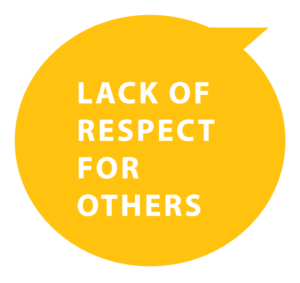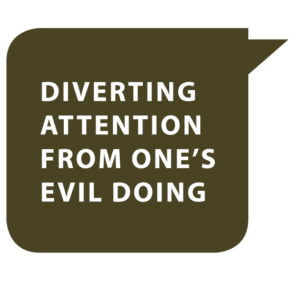Gossip is a sad and destructive fact of life. It damages reputations, ruins relationships, divides families and creates much bad blood. This article examines gossip under four heads: the undeniable evil it does; the reasons why people gossip; ways of stopping it; and cases where negative talk is not gossip.
Says Father Jason about Father Joe, who was his rector, “I have lived with him for years, never have I heard anything negative from his lips about anyone.”
What a lovely thing to hear! That rector was a human being who truly respected other human beings and treated their reputation as sacred.
Sadly, he is more the exception than the norm, isn’t he?
Another man has quite a different story, “I was a young teacher in the college. During lunch one day, a visitor came to the dining room. I didn’t know him. But one of the senior professors did. He got up and welcomed the newcomer enthusiastically, patting him on the back and saying how thrilled he was to meet him. Seeing his apparently warm response, I thought they were close friends, and that the senior professor was really overjoyed to meet an old friend. Imagine my unpleasant surprise soon after the visitor left. The senior man who had welcomed him with such profuse signs of warmth started speaking ill of the visitor. That was such a let-down for me. So, all that patting and nice words were mere show. People do not seem to mean what they say. Whom can I trust?”
Gossip is a sad and damaging fact of daily life. It is common, it is mean, it does enormous harm. It destroys reputations and splits families and communities asunder. Once we hear something obnoxious about someone, the way we look at that person changes, doesn’t it?
Why, then do people do it?
Why harm and soil, when we can as easily build up and heal?
Mrs Martha, teaching in a college run by a religious organization, told me, “I know lots of negative things about that community. Their own members come and tell us so many bad things about other community members.”
The one who hears such gossip does not by any means become the friend of the gossip-monger. He or she is shocked that people who are supposed to love one another pull each other down.
Humour Misused:
Some others use their God-gift of humour to ridicule others rather than cheer them up. Humour is a lovely gift, which can bring a smile to anyone’s face, and cause innocent laughter, which is so healthy and relaxing. Instead, some use humour to do harm.
Such was the case of Prakash, head of an institution, who took delight in getting negative news about people
and “publishing” them during meals and meetings. He could be funny. But his idea of “fun” was to ridicule others, imitate their physical defects and get people to laugh at people rather than with them. Someone who regularly had meals in Prakash’s company said this, “Meals have become a penance for me. Our leader seems to enjoy gathering dirt and spreading it.”
No wonder Pope Francis compares gossip to an act of terrorism. He said the gossip is like someone who puts a bomb in a bus stand and walks away. So many people get killed in the explosion. In a talk to religious on February 2 this year, this was his suggestion for the Year of Mercy, “If, in this Year of Mercy, each one of you could avoid becoming a terrorist of gossip, it would be a success for the Church, a great success of holiness!”
THE EVIL OF GOSSIP
What exactly is the evil we do when we gossip? Why is it a serious sin? Here are the reasons;
Gossip damages something very precious:
Years ago, during a visit to Mumbai, I met a Salesian priest whom I had taught decades earlier. He told me, “Of all of your talks in those two years, the one I remember best is the one on the evil of gossip. It made a deep impression on me.”
What did I tell these young seminarians? In seminars, this is how I present the issue.
I show them a thousand Rupees note and tell them, “To light a candle, all you need is match stick, which costs about two paise. Shall I, instead, use this Rs 1000 note to light a couple of candles and then crush the note and throw it away?” They look at me as if I were suggesting something totally crazy—which it is. I add, “If I were to do this, you would call me crazy, right? You would think: This Joe does not know the value of Rs 1000. He is using it just to light two candles and then throw the burnt note away!” My audience agrees.
Then I tell them, “If Peter and I were to meet during lunch today and speak ill of Paul, we are doing something far more serious than burning a Rs 1000 note; for Paul’s reputation is worth more than a thousand or ten thousand Rupees. Do you agree?”
They nod their heads in agreement.
Then, why do we do it?
Would we be pleased if others were to spoil our name by gossiping?
A person’s reputation is a treasure worth safeguarding. It is worth more than things—far more.
Its damaging impact goes on spreading:
The person who gossips tends to gossip with others who too enjoy gossip. They do not pick out the holiest person around for sharing gossip. If I speak ill of you to Mary and Martha, they will tell Paul and Pramod, Geetha and Kavitha about it. If they are gossips, they are likely to add and embellish details to make the gossip even spicier. Paul and Pramod, Geetha and Kavitha will tell ten others, and so on, and on. The poison spreads faster than we think. The one who enjoys hearing gossip is also someone who loves spreading it. I may have spoken ill of you to just one person, but I have no idea how many people will think badly of you because of my one act of gossip. Gossip does go viral.
The damage done cannot be erased
Suppose I come to my senses. Suppose I realize the evil I am doing through gossip, and want to undo the harm. There is no way I can erase harm I have done. I cannot go around and wipe off the dirt I have cast on someone’s reputation. I cannot put out the fire I have started, which by now has become a conflagration, and is raging and spreading.
Gossip is really an evil deed you cannot undo or erase.
It is different from damaging an object in a fit of anger. As I tell seminar participants, suppose I hurl this mike against the wall and it goes to pieces, the harm done is minor. We can always buy another mike. We can substitute one object with another.
Damaging your reputation is not like that. There is no way we can undo it. We cannot go around and find all the people who think badly of you because of my gossip, nor get into their minds and hearts and change their perception of you. The dirt I have thrown sticks. I am responsible for it.
It ruins one’s own reputation, too.
Gossip not only damages the reputation of the victim. It also spoils the name of the one who gossips. If I gossip, others will soon realize that I have a poisonous tongue. This is why a number of gossips, while seeming to have “friends” (people with whom they sit and chat and gossip) have no real friends—no one whom they trust and no one who trusts them. They end up lonely.
Not surprising! We are all looking for good people we can trust, not poisonous minds who are likely to spoil our name, just as they are ruining others’ reputation while talking to us.
Our mind becomes poisoned and sick
Any bad habit damages the doer most. Thus, alcoholism or drug addiction damages the addict the most. Anger and revenge hurts the angry person the most. Similarly, the habit of gossip will fill my mind with negative images of people. I will develop a “relish” for poisonous mental food (gossip) and be starved of loving and joyful conversation our spirits are really in need of.
WHY DO PEOPLE GOSSIP?
If gossip is such a mean and evil thing, why do so many people do it? Why don’t they see the harm, and stop? After all, all of us would be very upset if someone else were to spoil our name.
Here are the reasons why.
 Selfishness is easier and commoner than love. We don’t feel others’ pain; we feel bad when something hurts us. Many persons do not see a person’s reputation as something sacred and inviolable. In fact, if we talk of persons who consider themselves “religious” (belonging to a religion or religious organization), many such persons will be more concerned about the correct observance of religious ritual than about respect and justice in personal dealings. I may show greater “respect” for the church or temple building and ceremonies than about the people, whom God loves.
Selfishness is easier and commoner than love. We don’t feel others’ pain; we feel bad when something hurts us. Many persons do not see a person’s reputation as something sacred and inviolable. In fact, if we talk of persons who consider themselves “religious” (belonging to a religion or religious organization), many such persons will be more concerned about the correct observance of religious ritual than about respect and justice in personal dealings. I may show greater “respect” for the church or temple building and ceremonies than about the people, whom God loves.
 It is easier to pick up bad habits than good ones. Thus, gossiping or watching TV is easier to pick up than speaking of people with respect or using my time well. If I have the misfortune of belonging to a family (or any other organization) where gossip is rampant, I will tend to pick it up almost by osmosis and perpetuate the same vicious circle—until someone with courage and conviction breaks the circle.
It is easier to pick up bad habits than good ones. Thus, gossiping or watching TV is easier to pick up than speaking of people with respect or using my time well. If I have the misfortune of belonging to a family (or any other organization) where gossip is rampant, I will tend to pick it up almost by osmosis and perpetuate the same vicious circle—until someone with courage and conviction breaks the circle.
If nothing worthwhile grips my mind, if I don’t have stimulating habits like reading or writing or art or philanthropy, if I have not cultivated the habit of learning new things, then one of the easiest ways to fill my time is gossip. I can watch people. I can talk about people. I can find fault with people.
philanthropy, if I have not cultivated the habit of learning new things, then one of the easiest ways to fill my time is gossip. I can watch people. I can talk about people. I can find fault with people.
You may have heard the saying, “Small minds focus on people. Average minds focus on events. Big minds focus on issues.” Thus, if my mind and heart are big, a huge human tragedy like the suicide of 3000 farmers will grip my attention, and move me to do something about it. If I am a mediocre person, my conversation will be about who won the cricket match or what the weather is. If I am small-minded, I will be talking about who is doing what, who is getting transferred where, who has bought new clothes, etc.
So, check: Is my mind small, mediocre or large?
Decide: Do I want to be narrow-minded, mediocre or big-hearted?
 Some shrewd and malicious persons will bring in others’ failures into conversation with apparent concern. They pretend to be concerned, but they are not. They enjoy talking ill of others, but want to appear good and nice. They are dangerous. The one who sounds sweet, but spreads poison about others, is likely to do the same about you in your absence.
Some shrewd and malicious persons will bring in others’ failures into conversation with apparent concern. They pretend to be concerned, but they are not. They enjoy talking ill of others, but want to appear good and nice. They are dangerous. The one who sounds sweet, but spreads poison about others, is likely to do the same about you in your absence.
Those who have the most skeletons in the closet are the most likely to  blame others and speak ill of them. The best persons are the least likely to gossip. From the way a person speaks of others, you can learn much about the speaker’s character. What this person says about others may or may not be true. And what we hear from gossips tends to be false or highly exaggerated. But we get a pretty accurate picture of what sort of person the speaker is.
blame others and speak ill of them. The best persons are the least likely to gossip. From the way a person speaks of others, you can learn much about the speaker’s character. What this person says about others may or may not be true. And what we hear from gossips tends to be false or highly exaggerated. But we get a pretty accurate picture of what sort of person the speaker is.
…………………………………………………………………………………………………………………………………………………………………………………………………………………………………………………………………………………………………………………………………
HOW TO STOP:
How to get over this evil habit?
How do we fight it in our own settings?
Here are five steps.
- Reflect: What am I doing with my life and gifts?
Many people who gossip do not reflect. They swallow whatever they hear, and pass it on. They do not seem to think of the evil they are doing. If only they reflected, they would see the damage.
Why are we put on this earth?
Is it to damage others, and throw garbage around?
No, we are put on this earth, given health of body and mind, a working brain and the power of speech, to learn to love. We are here to increase the goodness in the world—not to pile up the dirt. What would you think of a neighbor who piled garbage at your gate every day, so that the whole place stinks? This stench is a good symbol of what gossip does. It is like someone with a foul-smelling wound who does not wash, who throws all the used bandages around. Is this how I want to go through the world? Spreading rot, spreading stench, attracting those who enjoy dirt rather than beauty?
When Buckminster Fuller—the creator of the geodesic dome and other engineering feats—was young, and fed up with life, he thought of suicide. Then, this thought came to him: “I have no right to take my life. I do not belong to myself. I belong to the whole world.” He went on to create such useful and beautiful things for humanity.
So, THINK! Why am I here? To collect and spread dirt, or to make this earth a more beautiful place?
- Take Jesus Seriously
Are you a Christian? Really? Or only a church-goer? There is a huge difference between the two. Jesus did not come on earth to teach us some ceremonies or how to behave in church. He taught us a way of LIFE. In fact, his toughest clashes were with groups within Judaism that considered themselves super-religious, meticulous in the observance of minute religious prescriptions. But they showed little compassion or respect for those they despised or thought inferior.
Not He. Jesus walked through this world differently. To be a Christian means to try to walk through the world as He did. Jesus taught us an ethic of relationships, not an ethic of cult. This means: What matters most in His teaching and example is not how we worship in church, but how we treat people. Thus, for instance, if I observe all the liturgical rules correctly, behave devoutly in church, but gossip during the day, I will be a very bad priest and a very bad Christian. At the end of our life, you and I will not be asked how we behaved in church or even whether we went to church, but how we helped others. The surest and clearest sign Jesus taught us as a sign we are His disciples is mutual love, not religious orthodoxy. In this, Jesus’ teaching is revolutionary—and simple to understand.
- Highlight the Good:
One day, at a family gathering, one of the sons began to talk ill of another family member. His older sister intervened, saying, “We came here to be happy together, and not to speak ill of anyone. We can say so many good things about others. Why don’t we do that?” Good point. Why don’t we? The same brain and tongue (both of them priceless gifts from God) that I am tempted to use for doing evil, were given to me for doing good. Just as I can use my physical strength to help a weak person or to be violent, I can use my mental gifts to spread goodness around, rather than diffuse poison.
- Cultivate positive interests.
An empty mind, we have heard, is the devil’s workshop. If I lack positive interests and passions that engage me—creative writing, helping others, visiting prisoners, finding money to help poor patients, coaching weak students, learning a new language, studying the Bible more deeply, visiting poor families, caring for the sick, cooking,….—my mind will easily wander to destructive thoughts and patterns. Watching others, finding fault with them, gossiping about them—these will become my hobbies, or, sadly, even my main occupation. I may not even notice that I am known as a poisonous tongue and that others despise me for it. I may think others enjoy the dirt I so freely dish out.
- Challenge those who gossip
Here is a case.
A group of sisters went to visit a community member who was hospitalized. After meeting the sick person, they came out to the verandah of the hospital, and started talking ill of the one who was sick. Then, one of the younger sisters said, “We came to see her. She is sick. Let us not stand here and talk ill of her. If we want to point out anything to her, we can do that directly when she comes back to the community.” With that, the gossip session stopped. Another young sister of the same community later told the one who had spoken courageously, “I was thinking the same, but I was afraid of saying it.”
Much evil exists or even grows in the world, not because of the superior power of evil-doers, but because of the cowardice, indifference and silence of the so-called “good” people. Nothing terrible will happen if we speak up for what we believe in. We tell ourselves that awful things will happen.
In politics or in business, the one who speaks up for justice or opposes injustice can pay a very heavy price. This is not the case in families or church settings. We often keep quiet, out of cowardice, or because we don’t care about another person’s name being tarnished. Would I be happy if somebody were to slander my name, and no one were to speak up for me?
…………………………………………………………………………………………………………………………………………………………………………………………………………………………………………………………………………………………………………………………………
WHEN IS “NEGATIVE TALK” OK?
When is it Ok, or even good?
Abraham Lincoln had this conviction, “He has the right to criticize, who has the heart to love.”
Thus, if my criticism is prompted by love, it can be legitimate, even loving.
When is this the case? Are there situations when it is correct to speak of someone’s negative traits?
Yes. Here are five such instances.
![]() To correct those in our care
To correct those in our care
Thus, parents can, and need to, talk together about their children, and see how to bring them up well. Part of a good upbringing is to correct their faults. Thus, if parents find that a son has started drinking or smoking, or the daughter is going out with the wrong type of friends, they need to talk this out between themselves, and then talk to the son or daughter directly. The father and mother talking about their child’s defects are not gossiping. Their talk is prompted by love.
To report wrong-doing to the right authorities![]()
When something evil is taking place, and I am not in a position to correct it, I can (and at times must) report it to the right authorities, who can take action. Thus, if there is fraud or injustice in an institution, it is perfectly fine for someone “on a lower rung” to report it to higher-ups. Or, if a child is being sexually abused, any one of us who is aware of it must report it to the authorities, to save the child.
This principle holds good both in civil and religious settings.
![]() To keep a check on public figures
To keep a check on public figures
Public figures—politicians, government employees, etc—are supposed to be servants of the public. The money they administer belongs to the people. So, for a democracy to function, a country needs an active and vigilant press. Without it, and a vibrant civil society, those in power will easily misuse their authority, and even oppress those who question them. Without a free and courageous press, our freedoms will be in danger. The corrupt politician and government servant will try to block access to information, to hide their wrong-doing. It is the death knell of our freedom when elected representatives and administrators start acting like our bosses rather than persons meant to serve the public.
![]() To warn an innocent person who may be victimized
To warn an innocent person who may be victimized
Suppose you hear marriage bans in the church. And you are aware that one of the parties is going to be duped. It may be that the bride or bridegroom may already be married, and is hiding this truth. Or they may be hiding criminal behavior or cases. In such cases, it is good (and can be a duty of conscience) to save the innocent party from the mess by speaking to them directly or informing the parish priest, who can tell the persons concerned. Silence in such cases would not be golden.
![]() To get competent help
To get competent help
“I have been abused from the age of three,” Alice, a thirty-year-old woman told me. She had been a victim of repeated sexual abuse. Persons like Alice have the right—and do well to—speak of their abuse, and get help and seek healing. In the process, they have the right to name the guilty persons, and to report them to the right authorities, so that further abuse can be prevented. This is not gossip. It is a victim’s right.
Such conversations take place in counselling and psychotherapy, as well as in legal settings. A person who has been hurt or abused, or is suffering in other ways, has the right to seek help. She has the right to seek redress, or to use legal means against the abuser.
Conclusion:
God gave me life, health, intelligence, speech, and all my other gifts. He didn’t give them to me to do harm, and leave a desolate and bitter trail of destruction behind me. No, God places me on His earth to make this a better place.
So, let me build, not destroy. Let me cultivate a garden, not a garbage dump.
When Helen’s family was divided over a small complaint that threatened to become an emotional cancer killing family unity, she took this attitude. Holding her thumb and a finger together to indicate something very small, she said, “Life lasts only this much. I don’t want to waste it on fighting.”
So true.
Life is such a short and precious thing. Do I want to waste it on spreading poison?
One of the best and most lasting things we can do in life is to build up others: point out what they are doing well, or their gifts, and encourage them to use these gifts. May we never ridicule or put down their attempts, nor poison others’ minds by spreading dirt.
Spread love, not dirt.
Build, don’t break, relationships.
Inject goodness, not poison, into the heart of people.
May your children, pupils and others in your care say this about you:
“I have been blessed to have you in my life. In all the years we were together, I never heard you say a mean or slanderous word. For you, others’ well-being and reputation were precious. Your words edified, built up, healed. They never crushed or poisoned other lives. “Your speech showed a clean mind and loving heart.
“This is how I want to live, too.
“Thank you for showing me how to walk through the world in love.”
– Fr. Joe Mannath SDB
To subscribe to the magazine Contact Us





